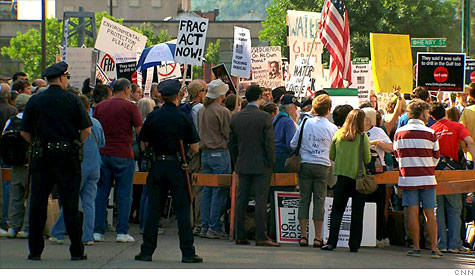Search News
 The energy industry has been taken aback by all the negative attention and protests over fracking and says it is looking for ways to improve.
The energy industry has been taken aback by all the negative attention and protests over fracking and says it is looking for ways to improve.
HOUSTON (CNNMoney) -- The oil and gas industry is reeling from attacks on what it considers one of its most important technologies -- fracking.
Protests across New York State, have temporarily banned the practice. Unfavorable coverage in the media and a scathing documentary film that was nominated this year for an Oscar also seem to have scared the industry.
"We've done a terrible job at getting our message out to the public," one gas company executive said during a roundtable discussion on the practice at IHS CERA's annual energy conference. "Now we're locked out of New York."
Technically known as hydraulic fracturing, the process uses water, sand, chemicals and pressure to crack rock deep beneath the earth's surface, releasing vast amounts of previously unattainable oil and gas.
It's unlocked a huge amount of new domestic energy, helped cut oil imports, and provided thousands of well paying jobs. Much of the technology has been used to increase natural gas supplies, which have the added benefit of being about twice as clean as coal when burned to make electricity.
But it's also got a lot people concerned about its effects on drinking water, and unleashed a firestorm of criticism.
The GasLand effect: The Oscar-nominated film GasLand has been mentioned several times during this conference, which draws some of the most powerful names in the business.
A recent investigation by the New York Times, which accused the industry of releasing radioactive water into Pennsylvania rivers without proper treatment, among other problems, has also been mentioned here.
Industry representatives seem genuinely convinced that the practice is safe, and that the problem lies with the public relations message, not the technology.
But several panels here have focused on ways to limit the risk to a company's brand, and the changing regulatory landscape.
The importance of water: How to reduce water usage and finding better ways to treat it have also been high on the agenda.
"The importance of water has been raised for the industry," John Alexander, head of the environmental consultancy ERM group, said during a panel on water, sustainability and the oil and gas businesses. "At the same time, public concern over water is very high."
The panel heard from MIT engineering professor Ahmed Ghoniem, who outlined several ways water from oil or gas wells can be treated. They include using chemicals, bacteria, heat, or pressure, often in facilities that resemble public sewage treatment plants.
Most energy experts believe fracking can be done safely -- the trick is finding the right amount of regulation that still keeps it economic for industry to produce the energy.
Currently most regulation is left up to the states, which have enacted rules of varying stringency.
The federal Environmental Protection Agency, which studied fracking and deemed it safe in 2004, is taking another, broader look at the practice and may end up taking a more active role.
Its study is expected to be finished next year.
Many companies are expecting broader regulation, and are trying to cash in on it.
An executive from General Electric (GE, Fortune 500), which has a big water purification businesses, told the CERA panel that 35 billion gallons of water are used in U.S. shale gas wells each year -- the same amount consumed by a million U.S. homes.(see correction)
A representative from the Obama administration was also on the panel.
"We're taking concerns about hydraulic fracturing very seriously," said Jason Bordoff, associate director for energy and climate change at the White House Council on Environmental Quality. "We want to make sure energy extraction does not come at the expense of public health."
Notably absent from the panel, however, was any representative from an oil or gas company that's currently fracking.
"Typical," said one attendee from a water purification company. "Put the environmental guys in a room and let them talk to each other."
But there's no doubt that they're paying attention.
Correction: A previous version of this story reported that a GE executive had said that 35 billion gallons of water are used in U.S. shale gas wells each day; in fact, that is the amount used each year. ![]()






| Index | Last | Change | % Change |
|---|---|---|---|
| Dow | 32,627.97 | -234.33 | -0.71% |
| Nasdaq | 13,215.24 | 99.07 | 0.76% |
| S&P 500 | 3,913.10 | -2.36 | -0.06% |
| Treasuries | 1.73 | 0.00 | 0.12% |
| Company | Price | Change | % Change |
|---|---|---|---|
| Ford Motor Co | 8.29 | 0.05 | 0.61% |
| Advanced Micro Devic... | 54.59 | 0.70 | 1.30% |
| Cisco Systems Inc | 47.49 | -2.44 | -4.89% |
| General Electric Co | 13.00 | -0.16 | -1.22% |
| Kraft Heinz Co | 27.84 | -2.20 | -7.32% |
|
Bankrupt toy retailer tells bankruptcy court it is looking at possibly reviving the Toys 'R' Us and Babies 'R' Us brands. More |
Land O'Lakes CEO Beth Ford charts her career path, from her first job to becoming the first openly gay CEO at a Fortune 500 company in an interview with CNN's Boss Files. More |
Honda and General Motors are creating a new generation of fully autonomous vehicles. More |
In 1998, Ntsiki Biyela won a scholarship to study wine making. Now she's about to launch her own brand. More |
Whether you hedge inflation or look for a return that outpaces inflation, here's how to prepare. More |